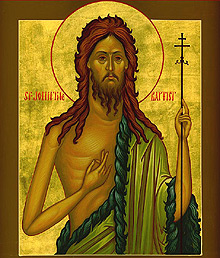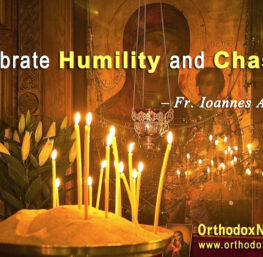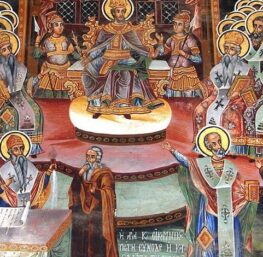
11/15/2010 – Deacon Douglas McManaman –
The word ‘human’ comes from the Latin ‘humus’, which means ‘dirt’ or ‘soil’. Man is from the earth.
I often tell my students that what they learn in the course of a semester, in their math class, for example, or in their chemistry classes, or physics, etc., took centuries for the most brilliant human beings to uncover. Once it has been uncovered, however, it appears to be so simple. Why did it take so long? This is true especially for philosophy. It takes years and years to dispose the intellect to learn such abstract truths, and from these truths it is possible to go on to demonstrate, through reason alone, the existence of God, and it is also possible, through reason alone, to show that God is one, eternal, the source of all that is good and beautiful, that He is Beauty Itself, Goodness Itself, and Truth Itself. And when we finally come to see it, we inevitably think: “This is so clear and simple; why did it take years to get this?”
The reason is that human beings, by nature, are slow. We are the highest beings on the hierarchy of material beings, but we are the lowest beings on the hierarchy of God’s intellectual creatures. Below us are the animals, and below them are plants, etc., but above us are angels, who are immaterial creatures, and their knowledge does not depend on sensation, imagination, nor is it subject to the passing of time, because they are not physical and do not exist in time. Their knowledge is not encumbered by matter as is ours. They see at a glance what it takes centuries for human beings to learn.
A humble person recognizes his limits, his frailty and vulnerability to destruction.
The word ‘human’ comes from the Latin ‘humus’, which means ‘dirt’ or ‘soil’. Man is from the earth. He is made of matter; he is a spirit and matter unity. As spirit, we can think and will, but as matter, we are weighed down, limited, and are vulnerable to destruction.
The word ‘humility’ is derived from the same word: “humus”. A humble person recognizes his limits, his frailty and vulnerability to destruction. He realizes that he is, fundamentally, dirt (dust and ashes).
And so we have the misfortune of being at the bottom of the hierarchy of God’s intellectual creatures. But maybe it’s not a misfortune at all. Perhaps the angels of God envy us after all. There’s no doubt, the glory of man does not consist in intelligence. Anyone who glories in his intelligence is in for a rude awakening when he discovers that his brilliance is only relative – compared to the choirs of angels, he’s on the lowest rung of the ladder.
So what is man’s glory? The glory of man lies in ‘humility’. A man who is intelligent is like the angels, but imperfectly so. But when he is humble, he is true to himself. The angels can be humble, but if we want, we can outdo them in humility. They cannot recognize that they are fundamentally dirt (soil), because they are not. We can, however.
The proud take themselves very seriously, but among saintly people there really is a great deal of laughter.
And God became flesh, joined a human nature, to show us what it means to be man, to reveal to us our glory. The image that reveals to us our true identity is the image of the cross. Our power is in the power of the cross. And that’s our glory. The angels cannot share in the sufferings of Christ, they cannot enter into the humiliation of the cross, but we can. The more we do so, the more glorious we become, paradoxically enough.
It is indeed sad to see that so many adults have missed this, especially those who rebel against God by writing books in an attempt to persuade others that God does not exist, that religion is evil, that man is the measure of moral truth, and that there is nothing higher than man, neither angels, God, nor truth itself. This is nothing more than that ancient tendency in man to ascend so as to take God’s place, which originated in the sin of Lucifer, the cherubim angel who fell through pride and lured the first parents of the human race into the current of his own sin.
The humbler we become, the more true to our nature we are.
Our life must move in the complete opposite direction. The humbler we become, the more true to our nature we are. And you know, when that begins to happen, the more laughter will there be in our lives; for the word humour is also derived from “humus”. The humbler we are, the more we are able to laugh at ourselves, for the less seriously do we take ourselves, and the more able we are to take in the humour that’s always around us. That is why among the arrogant one does not encounter a great deal of laughter – except the sardonic kind that delights in the humiliation of others. The proud take themselves very seriously, but among saintly people there really is a great deal of laughter.
HT: Catholic Education Resource Center originally posted on Oct. 2010
ACKNOWLEDGEMENT
Deacon Douglas McManaman. “The Glory of Humility.” CERC (October 30, 2010).
Homily for the 30th Saturday in Ordinary Time. Printed with permission of Deacon Douglas McManaman.
THE AUTHOR
Doug McManaman is a Deacon and a Religion and Philosophy teacher at Father Michael McGivney Catholic Academy in Markham, Ontario, Canada. He is the past president of the Canadian Fellowship of Catholic Scholars. He maintains the following web site for his students: A Catholic Philosophy and Theology Resource Page, in support of his students. He studied Philosophy at St. Jerome’s College in Waterloo, and Theology at the University of Montreal. Deacon McManaman is on the advisory board of the Catholic Education Resource Center.




For Christ, humility is probably the most important attribute a human being can have. Love is also important. So are truth and beauty. But humility is probably most important.
Humility is what’s absent, yet desperately needed in today’s world. It’s a tragedy that many (as in most) personalities and leaders in politics, science, arts, sports, or even in some religions appear arrogant and all-knowing, while crumbling down in pieces whenever they hear the word terrorism. Thank you for sharing your thoughts!